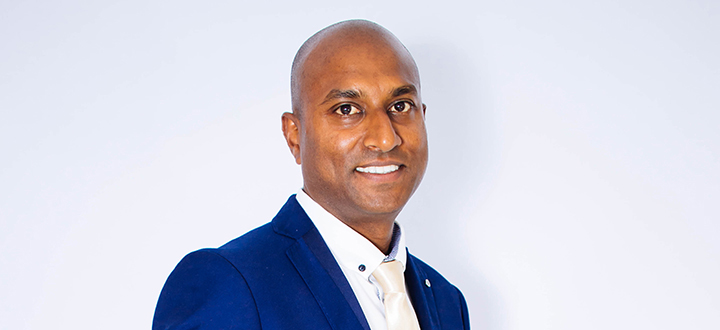News & Media
What can we do to strengthen health system leadership?
 Professor Lebitsi Maud Modiba from the Department of Health Studies in the College of Human Sciences recently delivered her inaugural lecture, titled Ethical leadership in health governance: Key to improving health system performance.
Professor Lebitsi Maud Modiba from the Department of Health Studies in the College of Human Sciences recently delivered her inaugural lecture, titled Ethical leadership in health governance: Key to improving health system performance.
She said that before embarking on her lecture, she had taken the time to listen to speakers and read about ethical leadership as discussed in the media. “I had conversations with myself and what I am going to present is a contemporary issue. My lecture today will highlight the importance of ethical leadership in organisations as leadership is regarded as the soul of an organisation because of its special role which is moral-laden.”
Modiba said that the frequent publicised ethical scandals and failures in both public and private sectors have raised the important questions about the role of leadership in shaping ethical conduct in organisations. This is particularly crucial in public organisations where the leaders exercise enormous power and have access to public resources that are needed for system performance.
She said there is no way that one can discuss leadership without discussing ethics, as it is regarded as crucial and it is found at the heart of leadership. “The leaders in organisations need to be knowledgeable in ethical principles and acquire ethical virtues to check the undue influence of self-interest as they carry out their responsibilities.”
As care becomes increasingly integrated and population based, a broader systematic approach to ethical leadership in healthcare is essential, in order to improve system performance, she continued. “Let me take a page from Judge Mokgoeng Mokgoeng as reflected in The Times of 12 April 2016, as it is one of writings that touched me. He purported that unethical leaders have damaged the South African nation, and that leaders should embrace ethical leadership. Ethical leadership is not an option but a national imperative. When you are a leader you have the authority to influence those that you lead and it was doing that largely determines what those who follow are likely to do.”
Modiba’s paper looked at the recent leadership landscape, which she said had really shifted in that health system performance had led to many lawsuits from patients and families, thus costing the department of health money. “By now we are all aware of the Life Esidimeni case, the KZN Health department medical negligence, and many more similar cases. These stories all point to ethical leadership; as a country we cannot ignore all these challenges.”
She said South Africa, despite having all the acts and policies in place, was still faced with many challenges that affect the whole community, such as a lack of leadership and management capacity within the public health sector in South Africa, and this is shown by the failure of the country to meet the Millennium Development Goals.
“The new sustainable development goals are a sharp reminder of this ‘unfinished business’. Despite the current leadership and the commitment from competent health service managers and professionals, incompetence in leadership and governance failures still exist across the system. It is exacerbated by a general lack of responsibility and accountability. Leadership is a necessary element of strong health systems, and so it is vital that South Africa nurtures and sustains leaders who can work strategically within their complex environments to develop a rights-based health system that promotes health equity.”
Some of the consequences and challenges linked to unethical leadership that she highlighted during her lecture were high maternal death, high prevalence of HIV infections, femicide and high rate of violence against women, poor leadership, poor governance, and the lack of accountability and lack of responsibility.
Therefore, her paper looked at what are the gaps in the leadership in the South African health system; how do we create ethical leadership that can direct and control organisations towards good governance and what can be done to build on this base and strengthen the leadership in the health system? “Our main argument is that ethical leadership may impact the ability of the country to meet its responsibilities to adapt and succeed in the future is necessary in order to mitigate the challenges.”
Modiba’s lecture explored ethical leadership as a concept and said that it was multi-dimensional. She listed competence, integrity, communication, and humility as some of the virtues that an ethical leader should have. She advised: “As a leader, develop a clear and coherent ethical framework. This will assist you to draw on in making decisions and taking action. A coherent ethical framework or philosophy does not pop into your head overnight. Your experience, your background, what you have been taught, and the actions of role models will assist you to develop your theoretical model.
“In other words, your ethical framework is built from everything that had gone into making you who you are. What is important is that having an ethical framework provides you with a basis for making difficult ethical decisions, rather than leaving you to struggle with each separate decision in a vacuum. Having such a foundation does not make you an ethical leader, but it helps your development as an ethical person, a necessary characteristic for an ethical leader.”
She added that the ethical framework should agree with the ethical framework, vision, and mission of the organisation. “If you do not buy into the ethical stance of the organisation, you should not take the job in the first place. Someone who truly believes her ethical duty is to make decisions for everyone, for instance, cannot ethically lead an organisation that is dedicated to collaborative decision-making and equal status as an ethical principle. Put the good of the organisation and the general good before your own interests and ego. One of the true tests of ethical leadership is making the decision that is best for the organisation even when it is not in the leader’s self-interest to do so. An ethical leader does nothing to compromise the philosophy or the vision and mission of the organisation. Encourage the discussion of ethics in general and of the ethical choices involved in specific situations and decisions and decisions as an ongoing feature of the organisational culture.”
Modiba also shared how she would carry out ethical leadership going forward. “As a teacher I will continue to teach my students to embrace ethical leadership. As a senior member of the department I will coach and mentor the young academics, and form part of discussions, discourse in the form of seminars and summits in order to address ethical issues and challenges because talking about the problems of leadership as individuals we will never win. I will work towards crafting a leadership hub in the Department of Health Studies where young leaders of tomorrow will be developed, conduct research in order to get first-hand experiences of leaders in their leadership role and join other colleagues nationally and internationally to discuss the role of ethical leadership in organisations.”
*Compiled by Rivonia Naidu-Hoffmeester
Publish date: 2018-10-23 00:00:00.0

 Young Unisa doctoral graduate joins elite Lindau Nobel Laureate group
Young Unisa doctoral graduate joins elite Lindau Nobel Laureate group
 Education MEC addresses Unisa autism seminar
Education MEC addresses Unisa autism seminar
 Seven Unisans nominated for the NSTF-South32 Awards 2023/2024
Seven Unisans nominated for the NSTF-South32 Awards 2023/2024
 Unisa awards posthumous honorary doctorate to literary maven, OK Matsepe
Unisa awards posthumous honorary doctorate to literary maven, OK Matsepe
 From humble beginnings to academic leadership
From humble beginnings to academic leadership